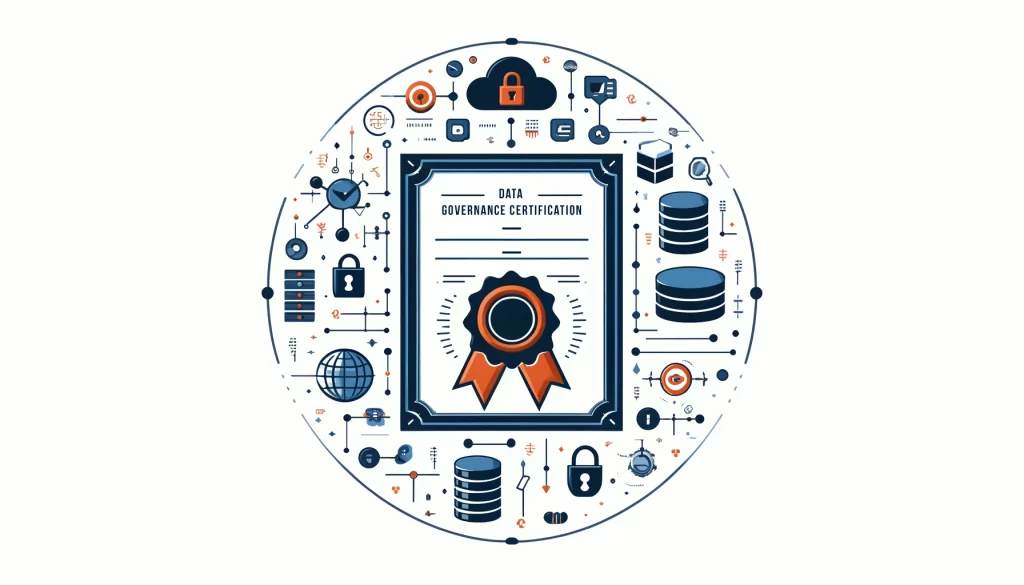
Data Governance Certification: Valuable Compliance

Data governance certification is important for protecting, maintaining, and using data to help businesses succeed.
At the heart of effective data governance are skilled professionals who possess a deep understanding of data management principles, best practices, and regulatory requirements.
Professionals who want to advance in their careers should consider obtaining certification in data governance. This certification is now more important than ever. It demonstrates their skills and knowledge in managing data effectively. By obtaining this certification, professionals can increase their chances of moving up in their careers.
Certifications from respected industry organizations show that a person is skilled in data governance. These certifications cover data quality, security, metadata management, and compliance.
The Value of Data Governance Certifications
Pursuing a data governance certification offers numerous benefits for both individuals and organizations. For professionals, earning a certification can:
- Enhance credibility in the job market
- Demonstrate a commitment to continuous learning and professional development
- Provide opportunities for career advancement and higher compensation
- Expand knowledge and practical skills in data governance best practices
- Facilitate networking with other certified professionals in the field
Organizations also benefit greatly from having certified data governance professionals on their teams. Certified individuals bring a wealth of knowledge and expertise to the table, helping organizations:
- Develop and implement effective data governance frameworks
- Ensure compliance with industry regulations and standards (e.g., GDPR, HIPAA, CCPA)
- Mitigate data-related risks and protect sensitive information
- Improve data quality and integrity across the enterprise
- Drive better decision-making through well-governed data assets
Real-World Applications
To illustrate the value of data governance certifications, let’s consider a real-world scenario. Imagine a healthcare organization that handles vast amounts of sensitive patient data.
The organization is subject to strict regulations like HIPAA, which mandates the protection of patient privacy and the secure handling of personal health information.
Hiring certified data governance professionals can help healthcare organizations meet industry standards and regulatory requirements. These professionals have the Certified Data Governance Professional (CDGP) designation from ICCP. Hiring them ensures that data governance practices are in line with industry standards and regulations.
These certified professionals can:
- Develop and enforce data access controls to prevent unauthorized access to patient data
- Implement data encryption and other security measures to protect sensitive information
- Establish data quality processes to ensure the accuracy and completeness of patient records
- Create and maintain data governance policies and procedures that comply with HIPAA regulations
- Conduct regular audits and assessments to identify and address any data governance gaps or risks
Having experts in data governance at the healthcare organization is important. It helps them follow the rules and avoid fines. It also makes patients feel more confident that their personal health information is safe.
Top Data Governance Certifications to Pursue
There are multiple reputable certifications to choose from, designed for professionals at different career stages and expertise levels. Some of the top certifications include:
- The Certified Data Management Professional (CDMP) is a certification offered by DAMA International. It covers various data management topics such as data governance, data architecture, data modeling, and data quality.
- The CDGP is a certification offered by ICCP. It focuses on the duties of data governance and stewardship professionals. The certification is thorough and comprehensive. It offers five levels of mastery, from foundation to executive.
- The Certified Information Management Professional (CIMP) is a comprehensive certification program offered by eLearning Curve. It covers a range of data management topics, such as data governance, data integration, master data management, and metadata modeling.
- Collibra offers four certification paths for professionals who want to show they are experts in the Collibra platform. These certifications range from the foundational “Ranger” level to the advanced “Expert Level 2” designation.
- Axon Certifications – Informatica is a well-known company that creates software for data management. They provide certifications for professionals in data governance, data quality, and data privacy. These certifications are for individuals who work with data. These certifications cater to different roles, such as content curators, power users, and administrators.
Consider your current knowledge, career goals, and company’s tools when choosing a data governance certification. Think about how much you already know. Consider what you want to achieve in your career. Also, think about the tools and technologies your company uses.
To get certifications, you need to pass exams that test your practical knowledge and ability to apply data governance concepts in real-life scenarios. Passing one or more exams is necessary to obtain many certifications.
Preparing for Data Governance Certification
To get a data governance certification, you need to make a study plan and set aside enough time to prepare.
Start by thoroughly reviewing the certification requirements and exam objectives provided by the certifying organization. This will give you a clear understanding of the topics and skills covered in the exam.
Next, gather study materials and resources to support your preparation. Many certifying organizations offer official study guides, practice exams, and training courses to help candidates prepare for their exams.
You can search for online groups and forums to connect with other professionals. They are also working towards getting the same certification. These platforms provide opportunities to network and share knowledge with like-minded individuals.
Connecting with others in your field can help you stay motivated and informed throughout the certification process. Joining these communities can also provide valuable resources and support as you work towards achieving your certification.
These networks provide valuable opportunities to ask questions, share experiences, and learn from others in the field.
As you study, focus on developing a deep understanding of data governance concepts, best practices, and real-world applications. Practice hands-on with sample datasets and case studies to apply your knowledge in real-world scenarios.
Regular practice will help reinforce your learning and build confidence in your ability to tackle exam questions.
When you feel prepared, schedule your certification exam and create a study plan leading up to the exam date. Make sure you have enough time to review and practice before your final exams. This will help you identify any areas where you need to study more.
The Future of Data Governance and Certifications
Organizations are dealing with the challenge of managing and using large amounts of data. This is leading to a growing demand for skilled data governance professionals. The need for these professionals is expected to increase in the future.
A report by MarketsandMarkets predicts that the global data governance market will reach $5.28 billion by 2026. The market is expected to grow at a rate of 20.8% annually.
Data management is growing because of several reasons. One reason is the increasing amount and complexity of data. Another reason is the need to follow constantly changing regulations. Additionally, data is now seen as a valuable asset that can improve business value.
As a result, professionals with these certifications will be well-positioned to take advantage of new career opportunities and make a meaningful impact within their organizations.
Moreover, as data governance practices continue to evolve, so too will the certification landscape. Certifying organizations will need to continually update their programs to reflect the latest best practices, technologies, and regulatory requirements.
Data governance professionals will need to continuously learn and recertify to stay up-to-date in their field.
Conclusion
Getting certified in data governance can help professionals move up in their careers and have a big impact in data management.
Getting certified by a respected industry organization can show your skills, boost your credibility, and create new career opportunities. Certification from a reputable organization can prove your abilities. It can also improve how others perceive you in your field. Additionally, it can lead to more chances for career growth.
Encouraging employees to get data governance certifications can help organizations in several ways. It can build a culture of data excellence, ensure compliance with industry regulations, and improve decision-making. This is achieved through well-governed data assets.
Don’t forget to keep current with the latest best practices and technologies in data governance. The field is constantly changing, so staying informed is key to achieving success.
Data governance professionals can add value to their organizations and influence the future of data management. They can achieve this by obtaining relevant certifications, staying updated with new information, and gaining hands-on experience.
